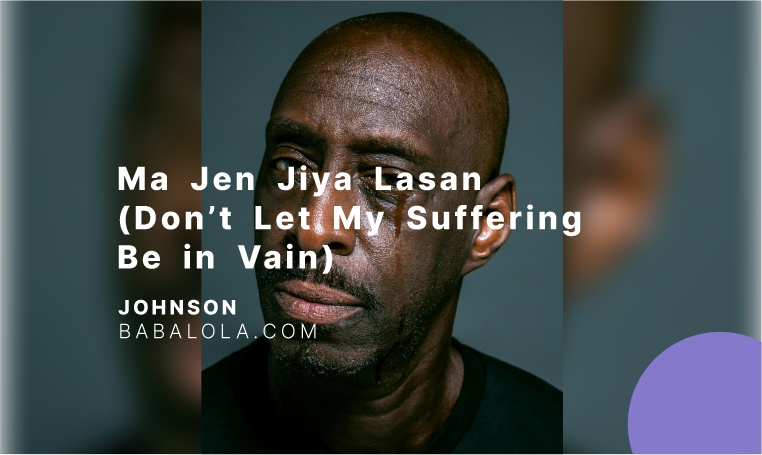Ma Jen Jiya Lasan (Don’t Let My Suffering Be in Vain)

Sitting in his Toronto home, Majiyagbe feigned interest in the 1800 hours news, but his mind refused to focus. Tears streamed down his face once again—it was the 10th anniversary of his mother’s passing. Despite his frequent tears for her, this day always hit him hardest. Determined to maintain composure, he sent his wife and daughter to visit a family friend in a nearby town. “Will you be okay?” his wife asked lovingly. “I will, I promise,” he assured her. But now, alone in his thoughts, he realized he was far from okay.
His mind drifted back to a conversation with his mother fifteen years ago in Ikorodu, Lagos, when he was just twenty.
“Mayiyagbe, my only child, you know the hardships we’ve endured,” she began, recounting the loss of his father and the subsequent family disputes over inheritance. She pleaded with him to preserve their modest home; the only symbol of their resilience left. “Ma jen jiya yi lasan” (don’t let my sufferings be in vain), she pleaded.
With each passing year, the pain of her sudden death intensified. Majiyagbe buried her in the local church cemetery, but the small two-bedroom house felt emptier without her. Financial struggles compounded his grief, and he battled to find stable employment.
Then, a glimmer of hope emerged in the form of an old classmate, PP, whom he met at a local mall. After sharing his hardships, PP offered to help him relocate to Canada. Despite Majiyagbe’s financial woes, PP remained optimistic, promising assistance with the relocation process.
The ensuing months were fraught with financial setbacks and dashed hopes. Despite his efforts, Majiyagbe found himself unable to secure the necessary funds. He grappled with the decision to sell the family home, ultimately betraying his mother’s wishes to keep it within the family.
Canada offered a fresh start, but guilt weighed heavily on Majiyagbe’s conscience. He missed his parents, especially his mother, and lamented breaking his promise to her.
As he reflected on his journey, he acknowledged his parents’ sacrifices and teachings. Though he faltered, their legacy endured, guiding him toward redemption.
Feeling the weight of regret, he grasped his phone, seeking solace from his psychotherapist. Amidst tearful murmurs, he silently pleaded for forgiveness and renewed his determination to reclaim his family’s lost home—the sole symbolic connection to their storied past and future. “E dari jimi. E o ni jiya yi gbe,” he whispered, as though speaking directly to his late mother, before dialing his therapist’s number.
Johnson Babalola, a Canada and Nigeria based lawyer, leadership consultant, storyteller and corporate emcee, is a public affairs analyst. Follow him for discussions on real life issues that affect us all.
You can obtain a copy of his newly released book, REJECTED on Amazon, FriesenPress, Barnes & Noble, Kobo, Google Play, Apple Books, Nook Store etc.



